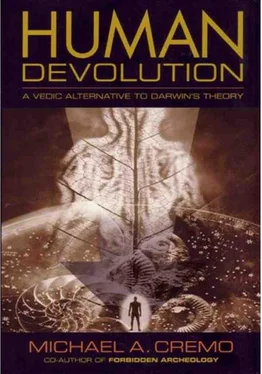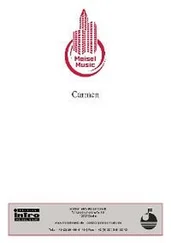Michael Cremo - Human Devolution - A Vedic Alternative To Darwin's Theory
Здесь есть возможность читать онлайн «Michael Cremo - Human Devolution - A Vedic Alternative To Darwin's Theory» весь текст электронной книги совершенно бесплатно (целиком полную версию без сокращений). В некоторых случаях можно слушать аудио, скачать через торрент в формате fb2 и присутствует краткое содержание. Год выпуска: 2003, ISBN: 2003, Издательство: Torchlight Publishing, Жанр: Старинная литература, на английском языке. Описание произведения, (предисловие) а так же отзывы посетителей доступны на портале библиотеки ЛибКат.
- Название:Human Devolution: A Vedic Alternative To Darwin's Theory
- Автор:
- Издательство:Torchlight Publishing
- Жанр:
- Год:2003
- ISBN:9780892133345
- Рейтинг книги:4 / 5. Голосов: 1
-
Избранное:Добавить в избранное
- Отзывы:
-
Ваша оценка:
- 80
- 1
- 2
- 3
- 4
- 5
Human Devolution: A Vedic Alternative To Darwin's Theory: краткое содержание, описание и аннотация
Предлагаем к чтению аннотацию, описание, краткое содержание или предисловие (зависит от того, что написал сам автор книги «Human Devolution: A Vedic Alternative To Darwin's Theory»). Если вы не нашли необходимую информацию о книге — напишите в комментариях, мы постараемся отыскать её.
Human Devolution: A Vedic Alternative To Darwin's Theory — читать онлайн бесплатно полную книгу (весь текст) целиком
Ниже представлен текст книги, разбитый по страницам. Система сохранения места последней прочитанной страницы, позволяет с удобством читать онлайн бесплатно книгу «Human Devolution: A Vedic Alternative To Darwin's Theory», без необходимости каждый раз заново искать на чём Вы остановились. Поставьте закладку, и сможете в любой момент перейти на страницу, на которой закончили чтение.
Интервал:
Закладка:
The Cosmic Hierarchy: A Cross-Cultural Study
Science provides substantial evidence supporting the assumption that a human being is composed of three things: matter, mind, and consciousness. This leads to the related assumption that our cosmos itself is divided into regions dominated by ordinary matter, mind, and spirit. Such cosmologies have existed in a vast number of cultures down through history.
These cosmologies include hierarchies of beings adapted to life at various levels. The structures of these hierarchies can often be complex, but one can see in them a basic pattern. At the top of the hierarchy is some kind of supreme guiding intelligence. Next comes a subordinate creator god, or demiurge. From the creator god come varieties of demigods, humans, plants, animals, ghosts, demons, and spirits. The highest level of the hierarchy, the level of the supreme guiding intelligence, God, is purely spiritual. The levels of the creator god and higher demigods are predominated by a mixture of spirit and the subtle material mind element. The lower levels, inhabited by minor demigods, humans, animals, and plants, are predominated by a mixture of spirit, mind, and a substantial amount of ordinary matter. These lower levels may include an underworld or hellish world, in addition to the ordinary terrestrial realm.
Humans, and all other living things we observe on earth, have a spiritual essence, or soul, which originates in the spiritual level of the cosmos. This spiritual essence is covered first by mind and then by matter,in a process that I call devolution.The process of devolution begins when the individual conscious self desires in a way that is incompatible with the spiritual harmony that exists between all beings in the spiritual world. According to their degree of departure from the original spiritual harmony, conscious selves receive subtler or grosser material bodies and fields of action. The higher demigods, who retain some considerable portion of their awareness of spiritual realities, receive bodies made primarily of the subtle material mind element, and act in an appropriate field. Those with grosser desires obtain not only a body of mind but also a body composed of a considerable amount of ordinary matter, capable of acting in the field predominated by ordinary matter. All of the bodies are programmed to last fixed durations of time. At the end of this duration, the soul obtains another body, according to the final state of its desires and consciousness. It is possible for a soul that has completely purified its desires to return to its original spiritual position. Otherwise, it receives another body, for another fixed term.
Cosmologies material and Spiritual
There have always been various ways of looking at the world, some of them materialistic, focusing on matter and its purely mechanical transformations, and some of them mystical or spiritual, focusing on the influence of God, or of gods and goddesses, on transformations of gross and subtle matter. At a certain time and place, a particular cosmology may become dominant within the most powerful and influential social groups. But alternative cosmologies remain simultaneously in existence, perhaps among the general population or among subdominant elites. In ancient times, spiritual, or mystical, cosmologies were dominant, but materialistic cosmologies were also current. For example, during the time of the Greeks, some philosophers, such as Democritus, proposed that everything in the universe could be reduced to material atoms. But spiritual philosophers were more numerous and influential. Today the positions are reversed. Materialistic cosmologies are dominant in elite circles and a substantial percentage of the general population, but spiritual cosmologies have survived. Not only have they survived, but their influence is growing, and they may soon once more become dominant within leading circles of society.
Billions of people in the world are still under the influence of spiritual cosmologies. They include, in addition to the orthodox followers of the principal world religions, practitioners of voodoo, santeria, shamanism, wiccam, etc. Even in the most technologically advanced populations, a surprising number of people display commitment to spiritual cosmologies or phenomena identified with these cosmologies. In 1990, the Gallup organization presented Americans with a list of 18 kinds of paranormal experiences associated with spiritual cosmologies. Only 7 percent of the respondents denied belief in any of them. About 50 percent expressed belief in five or more (Gallup and Newport 1990, p. 1). For example, 70 percent of Americans said they believed in life after death, 49 percent said they believed in extrasensory perception, 36 percent said they believed in telepathy, 46 percent said they believed in psychic healing, and
29 percent said they believed in ghosts haunting houses (Gallup and Newport 1990, p. 5). In addition to believing in such things, a good number claim to actually have experienced them. The Gallup report stated that “1 in 4 Americans believe they have had a telepathic experience in which they communicated with another person without using the traditional five senses, 1 in 6 Americans have felt they have been in touch with someone who had already died, [and] 1 in 10 claim to have seen or been in the presence of a ghost” (Gallup and Newport 1990, p. 1). Belief in paranormal phenomena connected with spiritual cosmologies is not limited to the general population. According to one survey (Wagner and Monet (1979), 57 percent of American college professors expressed belief in extrasensory perception. Another survey found that 30 percent of the heads of the divisions of the American Association for the Advancement of Science also believed in extrasensory perception (McClenon
1982).
But in the midst of this sea of persons committed to spiritual cosmologies there have arisen connected islands of scientific elites who are strongly committed to the materialistic cosmologies. And they have spread over the planet a web of economic, political, cultural, and intellectual institutions, founded on their materialistic cosmologies, and this web has somehow managed to attain a certain dynamic force and power, relative to the international institutional expressions of spiritual cosmologies. In this book, I am principally addressing myself to those people who have become entangled in this network of dominant materialistic institutions but who feel suffocated by it and wish to restore the planetary dominance of spiritual cosmologies. The first step must be a thorough critique of the assumptions underlying the materialistic cosmologies in their institutionalized manifestations, especially in educational institutions. To put it simply, students should begin to question the materialistic cosmologies imposed upon them by their teachers. And teachers can begin to question their administrative superiors, who in turn can question theirs. The representatives of institutionalized manifestations of materialistic cosmology should be confronted by advocates of spiritualist cosmologies in such a way that they begin to acknowledge them and negotiate with them. To some extent this is already happening.
In January 1999, I went to Capetown, South Africa, to present a paper on aspects of forbidden archeology at the World Archeological Congress, a major international conference. At one of the sessions I attended, a woman archeologist involved in major excavations at the Hittite site of Çatalhöyük in Turkey explained how the scientists in charge of the project, which is funded by such major multinational corporations as Shell, Glaxo-Wellcome, and Visa, were taking into account the alterna-
248 Human Devolution: a vedic alternative to Darwin’s theory
tive cosmologies of various parties interested in the site, including the New Age goddess worshipers. The cosmology of the modern goddess worshiper is a mystical one, quite different, in key respects, from that of a professional archeologist committed, as I assume most are, to the materialistic cosmology of modern science. But in this circumstance, the representatives of the materialistic cosmology found themselves compelled to negotiate with representatives of a spiritualistic cosmology.
Читать дальшеИнтервал:
Закладка:
Похожие книги на «Human Devolution: A Vedic Alternative To Darwin's Theory»
Представляем Вашему вниманию похожие книги на «Human Devolution: A Vedic Alternative To Darwin's Theory» списком для выбора. Мы отобрали схожую по названию и смыслу литературу в надежде предоставить читателям больше вариантов отыскать новые, интересные, ещё непрочитанные произведения.
Обсуждение, отзывы о книге «Human Devolution: A Vedic Alternative To Darwin's Theory» и просто собственные мнения читателей. Оставьте ваши комментарии, напишите, что Вы думаете о произведении, его смысле или главных героях. Укажите что конкретно понравилось, а что нет, и почему Вы так считаете.












